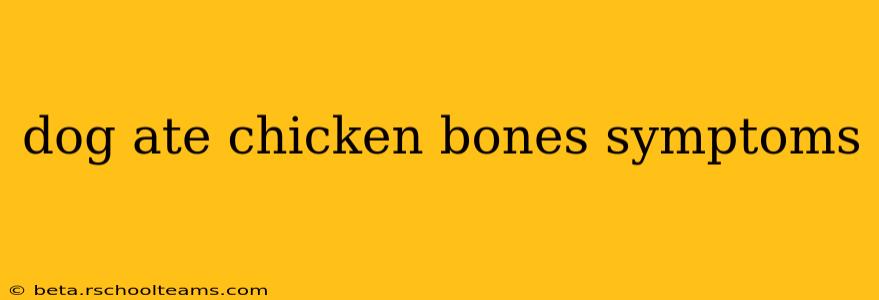Has your dog gotten into a chicken carcass and ingested some bones? This is a common scenario, but it can be a serious one. Chicken bones, unlike larger, denser bones, are brittle and can splinter easily, causing internal damage. Knowing the symptoms and what to do is crucial. This guide covers everything you need to know about what happens when a dog eats chicken bones, how to identify potential problems, and how to prevent future incidents.
What are the symptoms of a dog eating chicken bones?
The symptoms your dog exhibits after ingesting chicken bones will depend on several factors, including the size and number of bones swallowed, the size of your dog, and where the bone fragments lodge. Some dogs may show no symptoms at all, while others can experience severe complications.
Mild Symptoms:
- Mild gastrointestinal upset: This might include vomiting, diarrhea, or decreased appetite. These are often seen after the consumption of small pieces of bone.
- Constipation: Smaller bone fragments can sometimes cause constipation due to their abrasive nature.
Severe Symptoms:
- Vomiting blood (hematemesis): This indicates internal bleeding and is a serious emergency requiring immediate veterinary attention.
- Bloody diarrhea (hematochezia): Similar to vomiting blood, this points to internal injuries.
- Lethargy and weakness: This can signify pain, internal bleeding, or infection.
- Loss of appetite (anorexia): A significant decrease or complete loss of appetite is a warning sign.
- Difficulty swallowing (dysphagia): This suggests a bone fragment might be lodged in the esophagus.
- Pawing at the mouth: Your dog may be trying to dislodge a bone causing discomfort.
- Excessive drooling: This could also suggest a bone is causing irritation.
- Swollen abdomen: A sign of potential blockage or internal damage.
- Pain or discomfort: You may notice your dog whimpering, being reluctant to move, or exhibiting signs of abdominal pain.
What should I do if my dog ate chicken bones?
Immediate Action:
- Assess the situation: Determine how many and how large the bones were. If you witnessed the incident, this information is vital.
- Monitor your dog closely: Watch for any of the symptoms listed above.
- Contact your veterinarian: Even if your dog seems fine, contacting your vet is the best course of action. They can advise you on the best approach, potentially recommending inducing vomiting or monitoring your dog closely. Don't try to induce vomiting yourself unless your vet specifically instructs you to do so. Improper methods can worsen the situation.
Veterinary Treatment:
Depending on the severity of the situation, your vet may recommend various treatments. These can include:
- Observation: If the symptoms are mild or non-existent, your vet might recommend monitoring your dog closely.
- X-rays or ultrasound: To confirm the presence of bones and their location.
- Endoscopy: A procedure to remove bone fragments from the esophagus or stomach.
- Surgery: In severe cases where the bones have caused perforations or blockages, surgery may be necessary.
How can I prevent my dog from eating chicken bones?
Prevention is always better than cure. Here are some crucial steps to keep your dog safe:
- Never give your dog cooked chicken bones. Cooked bones are significantly more brittle and dangerous than raw bones.
- Supervise your dog while eating: Keep a close eye on your dog when you're eating, especially if there's chicken involved.
- Secure trash cans and compost bins: Ensure all containers holding potentially hazardous materials are properly sealed.
- Properly dispose of chicken bones: Immediately and safely dispose of all chicken bones after cooking or eating.
- Train your dog: Teach your dog commands like "leave it" or "drop it" to prevent them from scavenging.
My dog ate chicken bones and isn't showing any symptoms. Should I still be worried?
Even if your dog seems perfectly fine, it's still advisable to contact your veterinarian. Sometimes, symptoms may not appear immediately, and internal damage can occur without obvious outward signs. An x-ray can confirm whether any bones are present and provide peace of mind.
Can chicken bones cause a blockage in my dog?
Yes, chicken bones can cause a blockage in your dog's digestive tract, particularly if the bones are large or numerous. A blockage can lead to severe complications and requires immediate veterinary intervention.
How long does it take for chicken bones to pass through a dog's system?
The time it takes for chicken bones to pass through a dog's system varies greatly depending on the size and number of bones. Smaller fragments may pass unnoticed, while larger pieces could cause problems and require intervention. It's crucial to monitor your dog carefully.
This information is for general knowledge and should not be considered a substitute for professional veterinary advice. Always consult with your veterinarian if you suspect your dog has ingested chicken bones or is showing any concerning symptoms.
